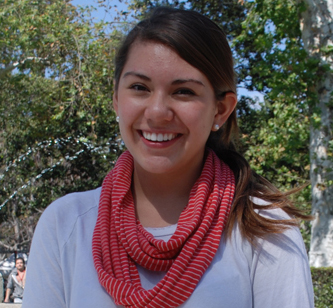
Rebecca Homan
After traveling to Rwanda on last summer’s problems Without Passports course, Rebecca Homan is one of the newest interns at the USC Shoah Foundation.
A sophomore international relations and environmental studies double major, Homan was in her first semester at USC when her Intro to International Relations professor Steven Lamy encouraged her to apply for the summer 2013 Problems Without Passports course “Conflict Resolution and Peace Research” in Rwanda. The course is led by USC Shoah Foundation’s Dan Leshem, associate director of research, and Amy Carnes, director of education – evaluation and scholarship.
Problems Without Passports courses, held in England, Brazil, Belize, Dubai, and more, allow USC undergraduates to engage in problem-based learning by conducting research in a foreign country. The Rwanda course studies the history, genocide, aftermath and creation of modern day Rwanda, immersing students in the complexities of socio-political reconstruction after genocide.
Following an intensive two-week preparatory session at USC, the class spends three weeks in Rwanda. There, students meet with NGOs, government officials and ambassadors, visit genocide memorials, and watch cultural performances, while traveling around the country. For their final projects, students develop their own ideas for moving Rwanda into the future.
For her final project, Homan and her group researched the legal side of post-genocide reconstruction in Rwanda, on the international, domestic and local levels, considering the question of how to “rebuild a society that doesn’t have a justice system.”
“It was a really good experience for me to get to go to Rwanda and see the progress they’ve made but there’s still a lot that needs to be done,” Homan said. “But it was really different from what I was expecting. They’ve come a long way.”
Homan began working as an intern at the USC Shoah Foundation this semester. She works with Carnes on a variety of projects including the IWitness in Rwanda program and other research. She’s also a member of STAND, USC’s student anti-genocide coalition. The group is currently petitioning USC administration to publicly condemn the conflict mineral trade and adopt practices that encourage reduction of the trade.
Homan encourages students to attend USC Shoah Foundation’s events to become more familiar with its work and get involved themselves. Watching Rwandan and Holocaust testimonies has taught her a lot about the two genocides, Homan said.
“Even though the contexts behind the genocides are different, there are still a lot of parallels between them,” she said.